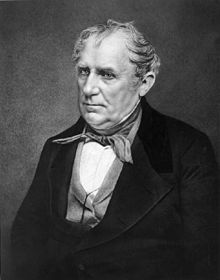Introduction to James Fenimore Cooper by Noah Long
James Fenimore Cooper (1789-1851)
by Noah Long

James Fenimore Cooper was born in New Jersey on September 15, 1789 to Elizabeth Fenimore and William Cooper, their eleventh child out of twelve. Both his mother and father came from Quaker families. His father founded a frontier settlement in upstate New York at the mouth of the Susquehanna River, which now bears their family name Cooperstown. It was to this settlement that William moved his family when Cooper was only one year old.
Cooper received a good education and attended Yale for 2 years before being expelled.
After his expulsion from Yale, Cooper joined the Navy. William Cooper’s passing in 1809 left Cooper with a multitude of financial burdens from his accession to the head of the family. It was this and a supposed challenge from his wife which prompted Cooper to begin writing novels. Despite his first novel getting a poor reception from audiences, his second novel became a bestseller and began his now famous legacy as a quintessential American author.
As previously stated, Cooper was born in 1789, this means he was born into an America that had just successfully gained independence from Great Britain in the prior generation. This means that this was a time in American history where the young nation was working to define what its overriding ideals and values were going to be. In a similar vein, many were looking for things which could be identified as uniquely American so as to differentiate the young United States from the countries of the Old World from which its people came.
It is also important to note the political climate that he was growing up and writing in, especially as his father served two terms in Congress. His father was a Federalist, this was a party that sought industrialization, strong national government, and protectionism. This was at the expense of the Democratic-Republicans who envisioned a more decentralized and agrarian future. These two schools of thought would eventually evolve into the Whigs and Democrats by the time Cooper was writing. It would seem he broke from some of his father’s beliefs in favor of more liberal notions as he was a great admirer of Thomas Jefferson. Despite this, he was an opponent of Jacksonian democracy, which could possibly shed some light on why American expansionism is not portrayed as morally black and white in his writing.
An important social impact of Cooper’s writing has to do with his contribution to the creation of uniquely American characters and settings that his novels were centered around. This is partly why after the release and great success of his second novel, “The Spy”, he had been dubbed “the American Sir Walter Scott”, a renowned Scottish novelist. The next novels that he wrote after “The Spy” are what really demonstrate this distinctly American feel to his writing and those are the “Leatherstocking Tales”. The setting of the American frontier, with European settlers and the Natives, was a setting that could not have been written of through inspiration taken from other European works like in the case of authors such as Washington Irving.
In a lot of his writing that deals with life on the frontier there is the theme of civilization and nature clashing. One passage in particular from “The Pioneers” exemplifies this conflict and uses the character of Natty Bumppo to do so. In chapter 22 of the novel, Natty Bumppo along with a hunting party come across a vast number of pigeons. The brash settlers in the hunting party begin killing a number of pigeons so great that they clearly had no intention of eating all of them. This show of civilization abusing the abundance of the natural world deeply upsets Natty Bumppo who chimes in, “‘This comes of settling a country!’” Being that the character of Natty Bumppo is a renegade outdoorsman who lives on the edge of civilization, his character to some degree represents the side of the natural world, juxtaposed with the side of civilization represented by the foolhardy settlers he reprimands.
This could also make a good prompt for future students to explore the themes of Cooper’s writings. A question such as, “How does the character of Natty Bumppo represent the themes of ‘The Pioneers’ or Cooper’s frontier writings in general?”. This could get to the conflict between civilization and the natural world that his character is constantly confronted with. This clash of civilization and the natural world is also emblematic of what the American frontier represented to many early Americans of the time and continued until the Wild West was tamed.
The part of “The Pioneers” that deals with pigeon hunting and Natty Bumppo’s opposition to it has been considered to be one of the first examples of American environmental literature. This would make the character of Natty Bumppo a paradoxical figure to a certain extent. While he opposes the excessive killing, he does not shy away from hunting when he needs to. While he wants to get away from the march of civilization brought on by the European settlers, he himself would not be on the continent if it weren’t for European settlers. This paradox in his character is somewhat explained by Bumppo in that same excerpt where he says to the other hunters, “Use, but don’t waste.”
Source: Text included with the permission of the author.
Image Credit: “James Fenimore Cooper” Photograph by Mathew Brady, 1850, Wikimedia, Public Domain

